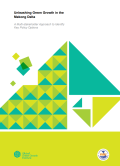
This report describes efforts by the ClimateWorks Foundation and the World Bank to quantify the multiple economic, social, and environmental benefits associated with policies and projects to reduce emissions in select sectors and regions.
The report has three objectives: 1) to develop a holistic, adaptable framework to capture and measure the multiple benefits of reducing emissions of several pollutants; 2) to demonstrate how local and national policymakers, members of the international development community, and others can use this framework to design and analyze policies and projects; and 3) to contribute a compelling rationale for effectively combining climate action with sustainable development and green growth worldwide.

This Scoping Report was produced through cooperation between the Viet Nam National Mekong Committee (VNMC) and the Global Green Growth Institute (GGGI) in reflecting a shared understanding that improved water resource management was considered as the key to sustainable development. The report provides a wealth of information to capture the link between water and economic growth in the Mekong Delta context and identifies the policy options which would support green growth in the Delta, from a conceptual viewpoint. It also provides an assessment tool which can prioritize green growth options and facilitate preparatory works for green growth policies in the Mekong Delta.
The report is designed to provide information to governments, business, academia and the public about the impact of climate change on the Arab countries, and encourage concrete action to face the challenge. The report analyzes the Arab response to the urgent need for adaptation measures, and uses the latest research findings to describe the vulnerabilities of natural and human systems in the Arab world to climate change and the impacts on different sectors. In an attempt to help shape adequate policies, the report discusses options for a post-Kyoto regime and outlines the state of international negotiations in this regard.
The Fifth Assessment Report from the Intergovernmental Panel on Climate Change is the most up-to-date, comprehensive and relevant analysis of our changing climate. Urban centres account for more than half of the world's population, most of its economic activity and the majority of energy-related emissions. This briefing explores the roles cities will play in the fight against climate change.
Regional Trade Agreements (RTAs) are increasingly used for addressing sustainable development goals by including provisions on climate change and sustainable energy. This paper examines that trend and presents an overview of different categories of such provisions in a broad sample of recent RTAs, identifying current regulatory challenges and highlighting obstacles in addressing climate change. It appeals to the necessity of securing flexibility for regulators in targeting new climate threats and the need for cooperation to implement international and national objectives in the efforts to enhance low-carbon technologies. After a preliminary assessment of the potential legal effects of the provisions, the authors make recommendations intended to optimize the potential of promoting the development of a sustainable low-carbon economy through trade agreements.
